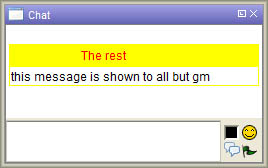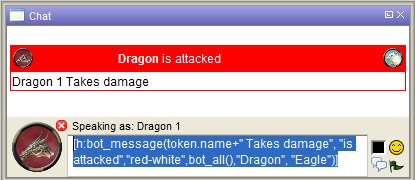broadcast: Difference between revisions
No edit summary |
No edit summary |
||
| Line 43: | Line 43: | ||
===Using the Bag of Tricks=== | |||
Now usually in a macro you would like to use the execution on user pc to happen for those users that own the token in context, or maybe you want to execute a macro on ALL clients but you have to figure out who the current 'executer' is and run the macro for that client separately as the execLink is only executed on remote clients. To make this a bit easier I've created a couple of function which are on the [http://forums.rptools.net/viewtopic.php?f=46&t=16066 Bag of Tricks (BoT)]. If you have the BoT installed then the following functions are available to you: | Now usually in a macro you would like to use the execution on user pc to happen for those users that own the token in context, or maybe you want to execute a macro on ALL clients but you have to figure out who the current 'executer' is and run the macro for that client separately as the execLink is only executed on remote clients. To make this a bit easier I've created a couple of function which are on the [http://forums.rptools.net/viewtopic.php?f=46&t=16066 Bag of Tricks (BoT)]. If you have the BoT installed then the following functions are available to you: | ||
Revision as of 09:06, 16 December 2013
broadcast() Function
Note: This function can only be used in a Trusted Macro
Usage
broadcast(message, [targets], [delimiter])Parameters
message- a message that is broadcasted to the users that are listed as parameters.targets- are the user names (so not token names) but the names of the users that are logged in. "gm" is also a valid parameter to give. E.g.: "tim, tom, tarra". Defaults to all players (so if no parameter is given the message is send to all players).delim- The delimiter used to separate the values in the String List that is given, defaults to",". If"json"is specified, a JSON array is expected instead of a String List.
Example
[h: broadcast("Hello World")]- Sending a message to gm only:
[h: broadcast("Hello World", "gm")]- Sending a message to tim and tom only:
[h: broadcast("Hello World", "tim, tom")]- Using the json as delimiter:
[h: broadcast("Hello World", '["tim", "tom"]')]- Executing the macro 'update()' located at 'lib:Token', for the token 'Dragon' on the PC of user 'Tim':
[h: link = macroLinkText("update@Lib:Token", "none", "", "Dragon")]
[h: broadcast(execLink(link), "tim")]
Using the Bag of Tricks
Now usually in a macro you would like to use the execution on user pc to happen for those users that own the token in context, or maybe you want to execute a macro on ALL clients but you have to figure out who the current 'executer' is and run the macro for that client separately as the execLink is only executed on remote clients. To make this a bit easier I've created a couple of function which are on the Bag of Tricks (BoT). If you have the BoT installed then the following functions are available to you:
bot_message()
bot_message(0:message [, 1:headertxt, 2:color (bgcolor-txtcolor), 3:userList, 4:token, 5:target, 6:broadcast])
Broadcasts a preformatted message to all users (default). The message consists out of a black (bg) and white (txt) header (default) and a delimited textbox below it, containing the message. When the message is left empty () only the header will be displayed. bot_message contains the following optional parameters (only message is required):
message- The message displayedheaderText- This defaults to: . The text in the header, note that the 'token' parameter is set in the header as well on the left side. E.g. when token is 'Wolf' and headerTxt is 'Attacks' the header will read 'Wolf Attacks'color- This defaults to 'black-white'. Here you can set the backgroundcolor-textcolor of the header. You can choose also to only set the backgroundcolor. Some examples: 'red', 'black-yellow', yellow-red'.userlist- Defaults to all(). Here you can set to whom the message should be send. You can either fill in a user name yourself (NOT TOKEN NAME!) e.g. 'Frank' or you can make use of one of the user functions defined here below, e.g. all(), gm(), ownergm().token- Defaults to . Here you can give the name of the token to which the message reflects. The effect is that the image and name of the token appears left in the headertarget- Defaults to . Here you can give the name of another token to which the message reflects. The effect is that the image of tha token appears right in the headerbroadcast- Defaults to 0 the message is NOT broadcasted but the entire structure is returned. This is usefull is you want to e.g. embed the result in another message; (1) (default) the message is immediately broadcasted
A couple examples of use:
[resultMsg = bot_message('Hello world', 'Header', 'black-white', bot_all(), 'Wolf', '', 0)][bot_message("Hellow world")][bot_message("this message is shown to gm only", "GM Only", "red-yellow", bot_gm())][bot_message("this message is shown to all but gm", "The rest", "yellow-red", bot_ngm())][h:bot_message(token.name+" Takes damage", "is attacked","red-white",bot_all(),"Dragon", "Eagle")]
The following functions can be used in conjunction with bot_message() and return a JSON ARRAY (e.g. ["Frank","Jim","Suzy"])
bot_all()- all usersbot_gm()- gm(s) onlybot_ngm()- all but NOT gm(s)bot_self()- initiator of the macrobot_nself()- all but NOT initiator of the macrobot_selfgm()- gm(s) and initiator of the macrobot_nselfgm()- all but NOT gm(s) and initiator of the macrobot_ownergm()- gm(s) and owners of the currentToken. So NOT the token that you might give as a parameter to the bot_message() function but the token that is currentToken() at that moment.bot_nownergm()- all but NOT gm(s) and owners of the current token
The 'bot_' prefixes in all these function are added as a precaution to make sure that there are no conflicts with a framework in which you use the BoT. If you however want to use these 'retrieve user' functions but without the 'bot_' prefix you need to create your own set of user defined functions. To do this paste the following piece of code in any onCampaignLoad macro in your framework:
bot_execAllPlayers()
bot_execAllPlayers (macroNname, arguments[, players, output to])
This macro executes the macro 'macroName' on ALL SELECTED clients. So in contrast of broadcast(execLink()) you do not have to worry about who is executing the macro.
macroName- name of the macro to executearguments- the arguments to pass on to that macro (in the form of an json array)players- a list of PLAYER names where to execute on (so not their token names). Defaults to 'all'output to- Send resulting output of macro to whom (self, gm, all, none, gm-self, list). Defaults to 'none'
Examples use:
- Executing the macro 'update()' located at 'lib:Token', with the parameters "Hello World" and "2" on the PC of user 'Tim', output the result to all:
[h: bot_execAllPlayer("update@lib:Token", json.append("","Hello World", 2), "Tim", "all")]
- The same but now for all players
[h: bot_execAllPlayer("update@lib:Token", json.append("","Hello World", 2), bot_all(), "all")]
